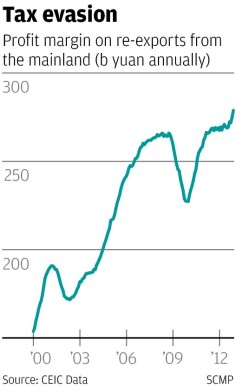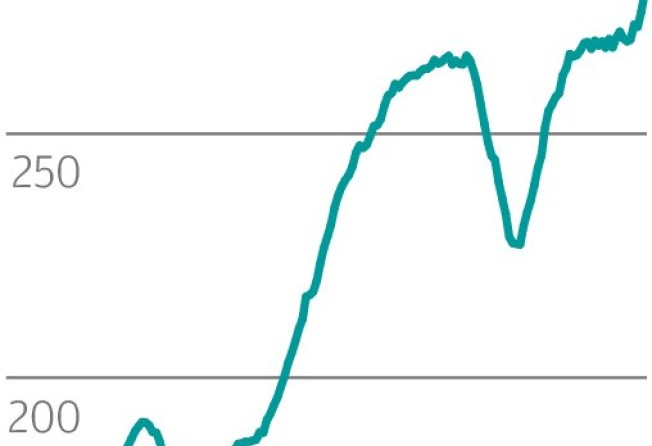
Keeping the taxman on the other side of the mountains
It's a tall order for tax chiefs to reprocess facts of how business is done on mainland, where money works best away from the state's reach

"As the next step, the taxation administration will rigorously investigate major cases of tax fraud," the [State Administration of Taxation] said.
SCMP, January 25
I am much taken by an old Chinese aphorism on relations between government and citizen - san go wong dai yuen : the mountains are high and the emperor is far away.
For a concrete example of it, look at the chart. Hong Kong's re-exports from the mainland to the rest of the world run at about HK$2.2 trillion a year at present and the average mark-up on these goods as they pass through Hong Kong is 16.3 per cent as of the latest available figures.
Both this mark-up, officially called the rate of re-export margin, and the word "re-export" itself imply that some work is done on these goods here. Let us say it produced only 5 per cent value added. That would still imply export reprocessing worth more than HK$100 billion a year. Can you tell me where in this town this work is being done? Don't ruin your eyesight.
What happens, of course, is that the goods are shipped out of the mainland at cost so that the Beijing taxman gets no profits tax and the profit margin is then added to the paperwork in Hong Kong, where there is also no tax assessment as our taxman fully recognises no work is done here.
It happens right in the emperor's home town, too. I once heard a senior World Bank official lamenting that its international development agency could find no market in Beijing for its low interest rate loans.
The problem was the World Bank's insistence that prospective borrowers pay their full tax obligations. You must be joking, they said.
I take it that the State Administration of Taxation is doing so with its latest pronouncements. Tax evasion is so deeply seated in the workings of the Chinese economy that to insist on full collections would be like firing a torpedo into the economy's engine room. Collections would probably drop rather than rise.
There is another reason why it would be a bad idea. Money kept away from the state's fingers is generally money invested more wisely than the state would invest it.
I grant you that some of this illegal hoard goes to high living rather than investment but there is only so much Chateau Lafake that anyone can drink, only so many Italian sports cars that anyone can let rust and only so much testosterone that any man can secrete. With the scale of the figures we are talking of, most of the money is reinvested.
And it is my contention that a significant proportion of the economy's growth over the past few years is attributable to the well directed investment of laundered money kept from the taxman.
In the hands of the bureaucrats the money would probably have gone to looking for curry on Mars.
Oh, my pardon, so this is what they are actually doing with the money right now, are they? Well, well.
In fact, I contend that it is probably true of the differences between public and private sector use of money in most of the world. Keep it from the taxman and your economy will do much better. An enforced diet may be the best prescription for confirmed gluttons.
But if I keep going along this line of reasoning I will soon be sailing a little near the wind where laws against subversion are concerned. Let us just say that it is political fashion these days to talk tough on tax evasion and Beijing mandarins are dedicated followers of fashion.